- Home
- Carolyn Keene
The Secret in the Old Attic Page 9
The Secret in the Old Attic Read online
Page 9
“It wasn’t your fault,” Nancy assured her. “Fortunately you weren’t hurt. And you’ve uncovered a clue!” she exclaimed.
Excitedly Nancy examined the torn place. Several tiny bars of music were painted on the wall!
Nancy summoned Mr. March to the stairway. At first he thought she was calling attention to the costume, but when the elderly man saw the music notes, he too became excited.
“Maybe it’s part of one of our old family songs!” he exclaimed. “I’d like to know if there’s any more of it here. Let’s tear off the paper!” Mr. March urged. “It’s too faded to worry about, anyway.”
Inch by inch, with the help of Nancy, Bess, and George, he removed a large area of the wall covering. It was slow, tedious work, but at last they were successful. Gradually a charming, old fashioned scene was revealed of a woman seated at a piano and a man beside her singing.
The last bit of paper to come off partially covered the music rack of the piano. Someone had sketched in a sheet of music, the notes of which had first drawn Nancy’s attention. Printed in tiny lettering was the composer’s name, a member of the March family.
Nancy hummed the pictured notes. The tune was indeed one which Fipp March had elaborated upon, and was a current “hit.”
“Now we have real proof that Ben Banks is an impostor! This is one of the melodies he claims as his!” Mr. March exclaimed.
“Would a court accept such evidence?” George asked.
“I think it would,” Nancy said soberly. “Of course it might not be necessary to go to such lengths. If Mr. Jenner knows we have a case against him, he’ll probably prefer to settle matters without a lawsuit. If you wish, Mr. March, I’ll see the publisher.”
“Yes, do that,” he urged.
Nancy asked Bess and George if they would accompany her to Mr. Jenner’s office in Oxford, a town several miles from River Heights. The girls were eager to go, and suggested starting at once. An hour later, they arrived at their destination, a dingy brick structure.
“This isn’t very inviting,” said Bess as they entered.
From an upstairs room came the strains of a swing band. In another section of the building someone was picking out a few notes on a piano.
“Listen!” Nancy cried suddenly.
“I don’t hear anything except that loud music,” George declared. “The tune is catchy but all those discords!”
“The person at the piano is playing one of Fipp March’s songs!” Nancy said.
The girls moved nearer to the closed door. Soon the piano playing ceased abruptly. After waiting a moment, the callers went along the hall until they came to a door which bore the name of the music publisher. Nancy and her friends entered.
They found themselves in an untidy little room. A desk was piled high with papers, books, and stacks of music. A girl sat at a typewriter. She chewed gum to the rhythm of her typing and did not look up for a long while.
“Well?” she inquired at last.
“May we see Mr. Jenner, please?” Nancy requested politely.
The girl looked her over from head to toe.
“If you have music to sell, you’ve come to the wrong place. Mr. Jenner isn’t buying from amateurs.”
“I have nothing to sell,” Nancy replied. “Please give my name to your employer.”
She removed a card from her purse. The office girl accepted it with a shrug and vanished into an inner room. She did not return for several minutes. Then her message was crisp and to the point.
“Mr. Jenner isn’t seeing anybody today except one of his composers. And he said to tell you it wouldn’t do any good to come back, either!”
“I see,” said Nancy. Flushing slightly, she turned away.
“I was afraid this might happen,” she declared as the girls paused in the hall.
“I feel like going back in there and demanding an interview!” George said.
“Let your father handle that horrid man,” Bess pleaded.
Determined not to go home without finding out something, Nancy paused again. Then she walked down the corridor where she suspected Mr. Jenner’s private office was located. Through an open transom came voices.
“Ben, we’re in a tight spot,” they heard the music publisher say. “That Drew girl has just left here. Maybe she has found some proof.”
“Impossible!” replied the other voice.
“Just the same, it may be well to call off your scheduled public appearances and lie low for a while. We can’t take chances.”
Nancy and her friends strained to hear more. The voices dropped, however, and the girls could not make out another word.
“Mr. Jenner must be talking to Ben Banks!” Nancy whispered excitedly. “Oh, I wish we could learn more about that fellow!”
“Maybe we can,” George said in her friend’s ear. “Why not stay around here until he comes out of the office?”
“And then follow him!” Nancy added. “You girls wait outside the building. I’ll watch this door.”
Bess and George immediately tiptoed down the hallway and vanished. Nancy looked about for a hiding place. The best one she could find was a little niche near the stairway.
Twenty minutes elapsed. At the end of that time the door of Mr. Jenner’s office opened. Out stepped a lean, long-haired man of early middle age. He had a roll of music under his arm. Nancy was convinced that he must be Ben Banks.
Waiting until he had rounded the corner, she followed him. At the street entrance she spotted Bess and George standing in a shadowy doorway. With a nod of her head she signaled to them.
The cousins immediately started off in pursuit of Ben Banks. Nancy waited until she was certain her movements would not arouse the songwriter’s suspicions. Then she hastened after her friends and caught up with them.
The man walked rapidly. Of one thing Nancy was certain: this thin man was not the strange intruder at the March homestead. The prowler was heavy-set.
Without once glancing back, Banks walked on until he came to a small hotel, the Millette. Entering, he went directly to the desk.
Nancy, Bess, and George stood in the lobby. They heard the man say to the desk clerk:
“My key, please.”
“Yes, Mr. Dight,” the other replied, handing it to him.
“Dight!” Nancy almost exclaimed aloud.
CHAPTER XVI
Poetic Hint
NANCY and her friends wondered if they had heard correctly. The name of the man they thought was Ben Banks was Dight! To make sure of this, the girls waited until the man had gone up in the elevator. Then they went to the desk.
“Is Mr. Banks registered here?” Nancy asked, smiling at the clerk.
“You mean the composer? Yes, but he uses his own name of Horace Dight. I’m sorry, but Mr. Dight can’t see you now. He left word that he didn’t want to be disturbed.”
The girls left the hotel. On the way back to River Heights, they discussed the new developments in the mystery.
“Do you suppose Mr. Dight is related to Diane’s family?” Bess asked.
“This so-called Ben Banks may very well be a relative,” Nancy agreed. “I’ll make it my business to find out. If he is, what a tangle this mystery is becoming!”
In the light of the day’s discovery, Mr. Drew’s case took on new significance. Nancy was eager to get home and talk to her father. She had been in the house only fifteen minutes before he came in.
Nancy asked, “How are things going in the Dight case?”
“Not good for him. Mr. Booker has just informed me that his chemist has analyzed the bottles of fluid you obtained from the Dight factory.”
“With what result, Dad?”
“The solutions are the same as those used in the Booker plant to toughen the spider thread.”
“Then Lawrence Dight did steal the formula —or rather, hired Bushy Trott to do it!”
“It appears that way. I’ve decided to prosecute Dight as soon as I can prepare my case.”
Nancy then
told her father what she had learned about Ben Banks, and the fact that the man’s real name was Horace Dight.
“Affairs are getting complicated,” the lawyer mused.
“I certainly need your advice,” Nancy said. “Can you find out anything about Horace Dight?”
“Let me check my files at the office to see if I have anything on him,” Mr. Drew offered.
A quick call to his secretary revealed that Lawrence Dight did indeed have a second cousin named Horace.
“You’re a really thorough investigator,” Nancy remarked with a smile.
“Well, you never know when some small detail about a man’s background may prove very useful,” Carson Drew replied. “In this case, all I have to go on is the fact that this cousin Horace is a loafer about the same age as Lawrence Dight.”
“Where do we go from here?” Nancy wondered. “Ben Banks learned from Mr. Jenner that a certain Nancy Drew knows something about him and wants to know more. He may mention my name to the River Heights Dight family.”
“I never thought of that!” exclaimed Mr. Drew. “Maybe I’d better hold up the proceedings against Lawrence Dight until you clear up the March case. And have you found any more of Fipp’s songs?”
Nancy shook her head.
“I certainly hope you can,” her father said. “Mr. Hawkins has purchased that song you brought me.”
“Wonderful!” Nancy exclaimed.
“I received a letter from Hawkins this morning. He liked Fipp March’s song very much, and he wants more like it.”
“If only I could supply some! So far I haven’t been able to find another piece, Dad. But I believe I have a good clue this time.”
She told her father about hearing a tune on the radio which Mr. March believed to be Fipp’s and which contained the phrase “My heart’s desire.”
“I recall reading those words in one of the letters Fipp March wrote to his wife,” Nancy explained. “I believe the clue to the missing music —if there’s any that hasn’t been stolen—may be in those letters after all. Suppose I get them—”
“You’d better pack some clothes and slip away from here,” her father advised. “If the Dight cousins suspect you’re after them, I’d feel better if they don’t know for sure where to find you.”
“I see what you mean,” Nancy agreed and paused a moment. “The March mansion will serve that purpose. And there’s so much at the house I want to investigate. I’ll leave now and take the letters with me.”
“Good! I’ll drive out there if I have anything to report before I hear from you.”
Nancy was sorry to leave her father so soon, but he wanted her to get back to Pleasant Hedges while it was still daylight. She had had so much to talk to him about that she had forgotten completely to tell him of the appearance of the strange intruder at the March home.
Upon reaching the old mansion, Nancy immediately sought out Mr. March. She told him that her father’s client had bought Fipp’s song.
“That’s marvelous! Now my son and the March family will have recognition at last. Nancy, I never can repay you for what you’ve done!”
“Mr. Hawkins would like more songs.” Nancy smiled. “I’m going to search harder than ever for them now. Here are your son’s letters. Let’s look through them for clues.”
For some time the elderly man and his guest read without saying a word.
Then suddenly Nancy cried out, “Here’s what I was looking for! Listen to this!”
Nancy read from one of Fipp March’s letters to his wife:
“‘No love more true than mine,
I would protect thee every day.
Among old things and fine,
I put my heart’s desire away.’”
“It’s a pretty verse,” said Mr. March. “But as to its being a clue—”
Nancy gave her interpretation of the words. “Your son wanted to provide for his wife always. He put the song with the words ‘My heart’s desire’ among some fine old things. She was to find the music and sell it if the need arose.”
“I see. And you think he meant he hid it somewhere in our attic?”
“Perhaps,” Nancy replied. “Let’s see if we can find another clue among these letters. I have a hunch the key to the mystery is right here.”
A very few minutes later Nancy came across a lovely verse. “I believe I’ve found it!” she exclaimed excitedly. She read it aloud:
“‘Long-forgotten man,
My secret you hide,
Reveal it to my love,
That comfort may abide.’ ”
“That means less to me than the other verse,” declared Mr. March. “What do you make of it?”
“‘Long-forgotten man’ must be the skeleton! He guards a secret which, when found, will bring comfort to your son’s family!”
“Maybe,” the elderly man agreed. “But you’ve already found the secret drawer in the wardrobe. There was only one song in it.”
Despite this, Nancy was hopeful about the skeleton clue. She insisted upon going to the attic at once for a further investigation of the skeleton and the wardrobe. Mr. March followed her, carrying a lighted candle.
“I can’t stand many more disappointments,” he said in a gloomy tone. “Each time I think something surely will come of the search, only failure has been the result. I haven’t enough money to start suit against Ben Banks or Harry Hall.”
“I have a hunch that this time we’re going to be successful!” Nancy declared.
As soon as they reached the attic, Nancy went to the old wardrobe and gingerly opened the door. This time she had a very different impression of the skeleton. It did not seem sinister to her; in fact, she could almost imagine it was trying to be friendly.
“Maybe that’s just because we’ve met so often!” she thought with a smile. “Or else it could hold a very vital clue to good fortune for Mr. March and Susan.”
Carefully she removed the bony skeleton from the hook. Where its head had hung, a tiny hole could be seen on the back wall of the wardrobe!
“Perhaps this means something!” she said with increasing hope.
A long, round curtain rod lay on the floor. She picked it up and carefully ran one end through the circular hole in the wardrobe. The rod touched no wall or object beyond.
Puzzled, Nancy removed the rod and peered through the tiny hole. She could see nothing—not even a glimmer of light.
“That’s odd,” she said to Mr. March and stepped aside so he could take a look.
“Wh-what do you suppose—?” the elderly man gasped.
“I always assumed,” Nancy said, “that this wardrobe stood against an outside wall of the attic.”
“I did myself,” Mr. March added, still mystified.
“There must be a room or niche beyond! Otherwise we’d see daylight!”
“You’re right, my dear.” Mr. March shook his head. He laughed gently and added, “To think I’ve lived here all these years without discovering this! You’ve shown me now that I must not take anything for granted.”
Thrilled by her discovery, Nancy said she would run downstairs and out-of-doors to take a look at the architecture of the house. When she inspected the exterior of the mansion critically, she could see that a small section of the main house connected with the roof over the old servants’ quarters.
“There must be a secret room up there,” Nancy thought excitedly.
CHAPTER XVII
The Hidden Room
DARTING into the house, Nancy hurried back to the attic.
“Learn anything?” Mr. March asked.
“Oh yes.” Breathlessly she told him of her find.
“I never knew of any hidden room!” he exclaimed. “But come to think of it, Fipp would disappear for hours at a time. We didn’t know where he was and he never told us anything, so we didn’t ask.”
“Perhaps your son found the room and kept it a secret for his music! Let’s move the wardrobe and investigate.”
Nancy and Mr. March fou
nd it was too heavy for them to budge, so Nancy went off to summon Effie from her supper preparations.
“We need a strong pusher,” she told the maid.
Effie grinned. “I can oblige,” she said. “What’s on your mind?”
“Furniture moving.”
By working together the three finally succeeded in shifting the massive oak wardrobe a few more inches. Susan, who had come upstairs, watched with deep interest.
Suddenly she clapped her hands and began to dance around excitedly.
“There it is! A door with a peephole in the wall!”
“Sure’s you’re born, it is!” Effie agreed, staring in astonishment. “I wouldn’t have believed it. Yet there seems to be all kinds of funny things going on around here.”
The door was a crude, homemade affair, evidently built by someone with little skill in carpentry or craftsmanship.
“Fipp must have put that in himself, the ras-call” Mr. March chuckled. “He was always tinkering.”
Nancy unbolted the door and pushed with all her strength. It refused to give.
“That’s queer,” said Mr. March. “Let me try it.”
He had no better success than Nancy. Effie also tried but to no avail.
“It must be bolted on the other side,” she said. “In that case we’ll never be able to get in.”
Many thoughts flashed through Nancy’s mind. The strange musical notes and the rapping sounds she had heard must have come from beyond this locked door. With no apparent opening to the place from the old servants’ quarters, how did anyone get inside?
Effie whispered hoarsely, “I’ll bet there’s a ghost beyond there! Please leave it alone. Don’t let it out! No telling what it’ll do to us!”
The remark brought Nancy back to reality. She was provoked that the maid had spoken, for her statement had frightened Susan. The child clung to Nancy.
“Effie, go downstairs and take Susan with you,” Nancy said, rather severely. “There are no such things as ghosts and you know it. Mr. March and I will continue the work alone.”
The maid, somewhat embarrassed, took the child by the hand and went to the second floor. Although Nancy had declared there could not be a ghost beyond the locked door, she was apprehensive as to what they might find.

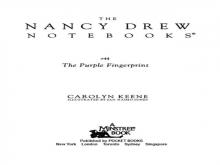 The Purple Fingerprint
The Purple Fingerprint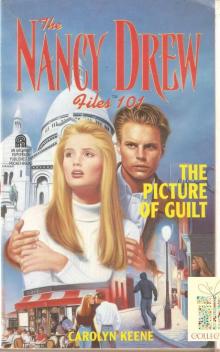 The Picture of Guilt
The Picture of Guilt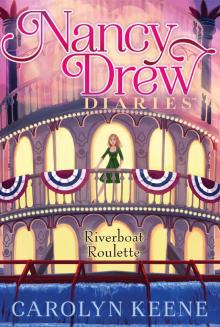 Riverboat Roulette
Riverboat Roulette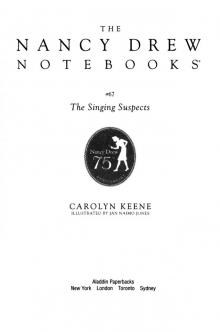 The Singing Suspects
The Singing Suspects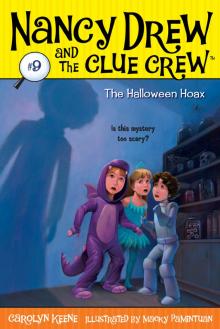 The Halloween Hoax
The Halloween Hoax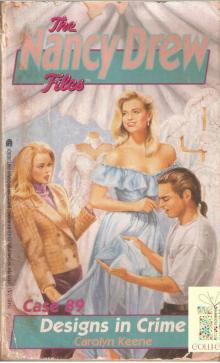 089 Designs in Crime
089 Designs in Crime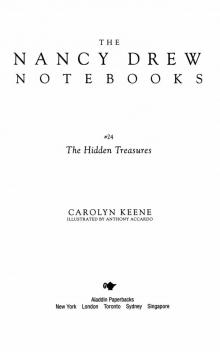 The Hidden Treasures
The Hidden Treasures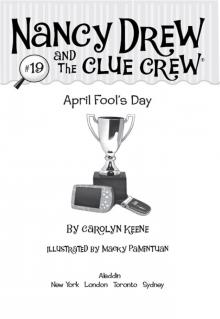 April Fool's Day
April Fool's Day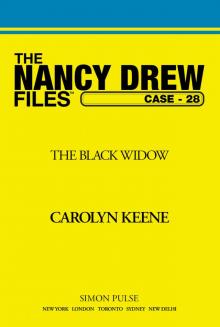 The Black Widow
The Black Widow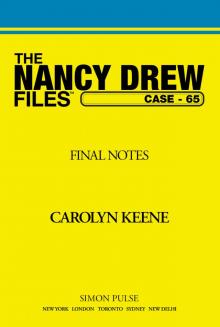 Final Notes
Final Notes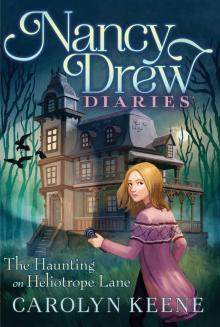 The Haunting on Heliotrope Lane
The Haunting on Heliotrope Lane The Runaway Bride
The Runaway Bride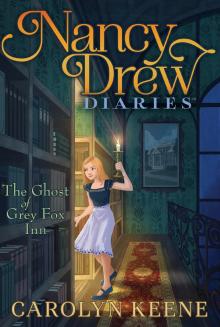 The Ghost of Grey Fox Inn
The Ghost of Grey Fox Inn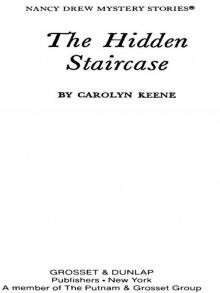 The Hidden Staircase
The Hidden Staircase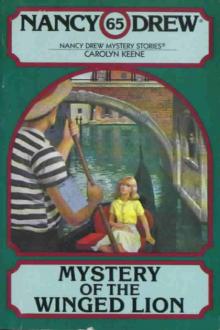 Mystery of the Winged Lion
Mystery of the Winged Lion Over the Edge
Over the Edge The Circus Scare
The Circus Scare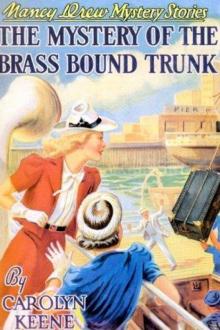 The Mystery of the Brass-Bound Trunk
The Mystery of the Brass-Bound Trunk Ski School Sneak
Ski School Sneak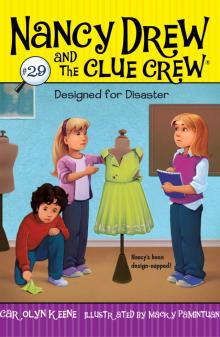 Designed for Disaster
Designed for Disaster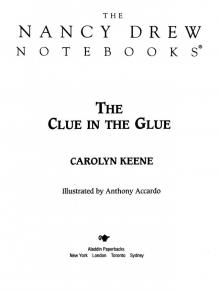 The Clue in the Glue
The Clue in the Glue Cold as Ice
Cold as Ice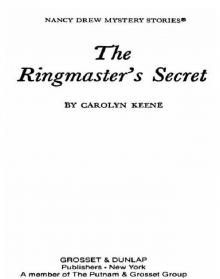 The Ringmaster's Secret
The Ringmaster's Secret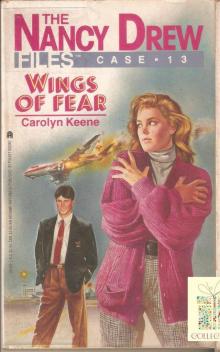 013 Wings of Fear
013 Wings of Fear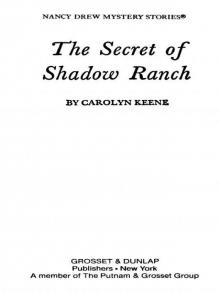 The Secret of Shadow Ranch
The Secret of Shadow Ranch Not Nice on Ice
Not Nice on Ice Earth Day Escapade
Earth Day Escapade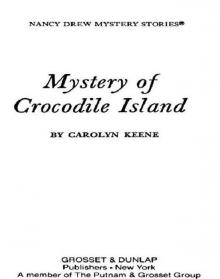 Mystery of Crocodile Island
Mystery of Crocodile Island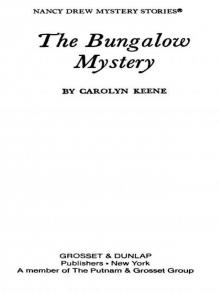 The Bungalow Mystery
The Bungalow Mystery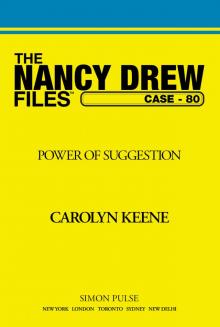 Power of Suggestion
Power of Suggestion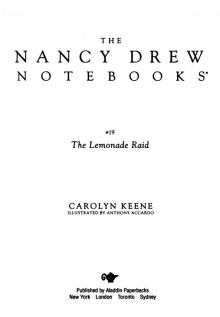 The Lemonade Raid
The Lemonade Raid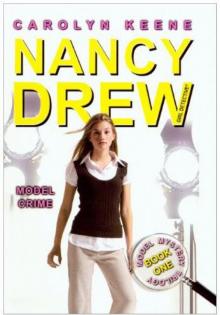 Model Crime
Model Crime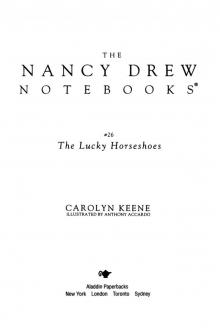 The Lucky Horseshoes
The Lucky Horseshoes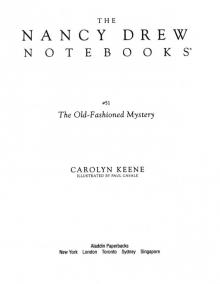 The Secret of the Old Clock
The Secret of the Old Clock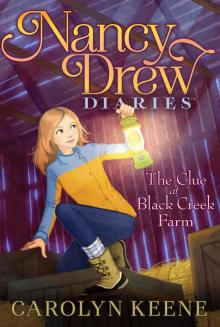 The Clue at Black Creek Farm
The Clue at Black Creek Farm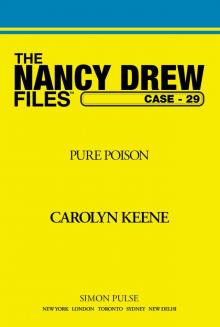 Pure Poison
Pure Poison Nobody's Business
Nobody's Business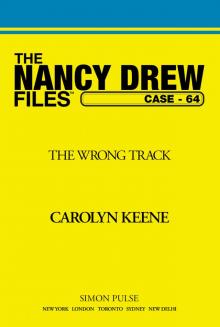 Wrong Track
Wrong Track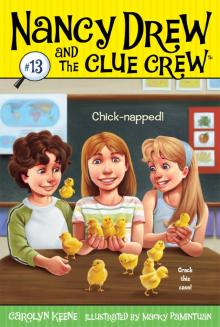 Chick-Napped!
Chick-Napped!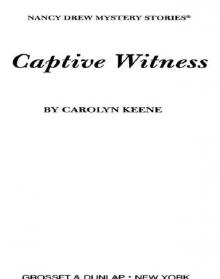 Captive Witness
Captive Witness If Looks Could Kill
If Looks Could Kill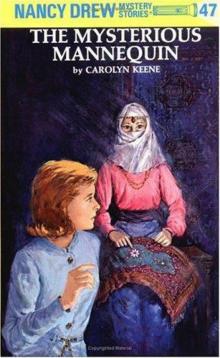 The Mysterious Mannequin
The Mysterious Mannequin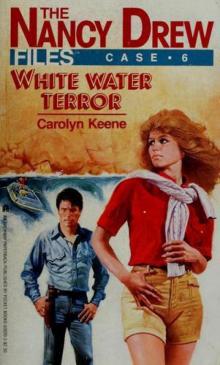 White Water Terror
White Water Terror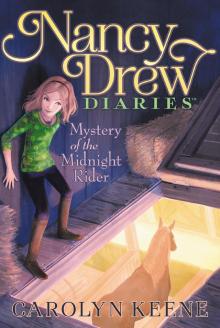 Mystery of the Midnight Rider
Mystery of the Midnight Rider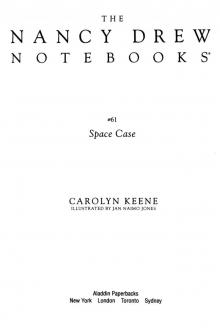 Space Case
Space Case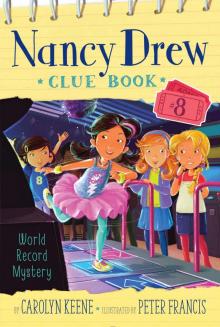 World Record Mystery
World Record Mystery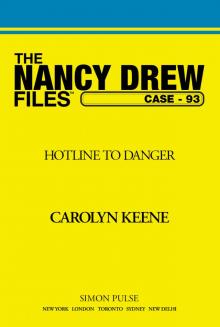 Hotline to Danger
Hotline to Danger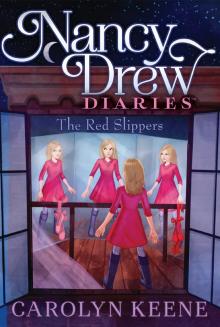 The Red Slippers
The Red Slippers A Crime for Christmas
A Crime for Christmas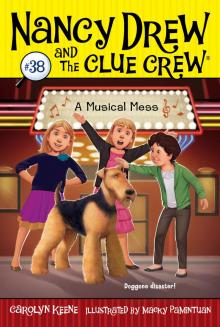 A Musical Mess
A Musical Mess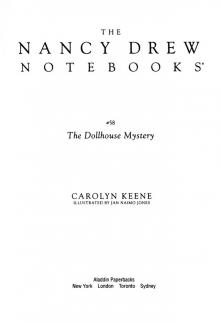 The Dollhouse Mystery
The Dollhouse Mystery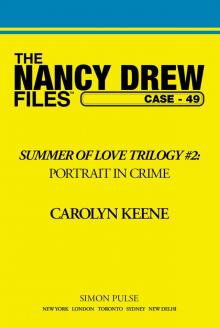 Portrait in Crime
Portrait in Crime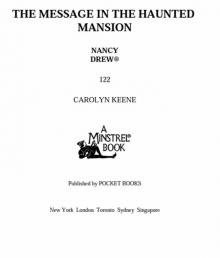 The Message in the Haunted Mansion
The Message in the Haunted Mansion Playing With Fire
Playing With Fire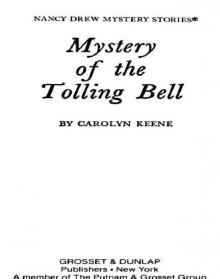 Mystery of the Tolling Bell
Mystery of the Tolling Bell Cutting Edge
Cutting Edge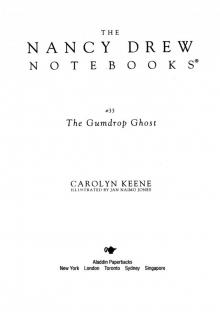 The Gumdrop Ghost
The Gumdrop Ghost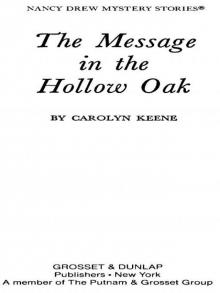 The Message in the Hollow Oak
The Message in the Hollow Oak Trial by Fire
Trial by Fire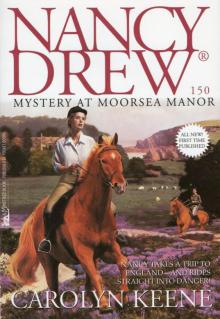 Mystery at Moorsea Manor
Mystery at Moorsea Manor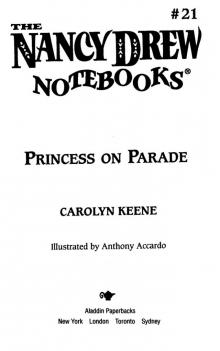 Princess on Parade
Princess on Parade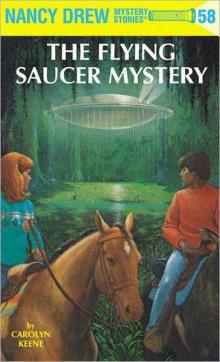 The Flying Saucer Mystery
The Flying Saucer Mystery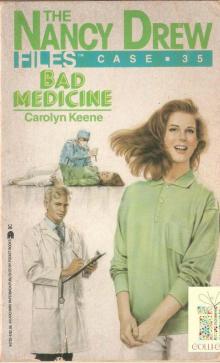 035 Bad Medicine
035 Bad Medicine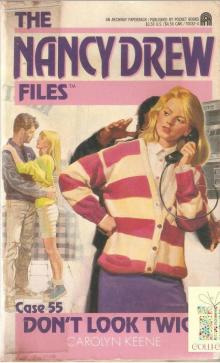 055 Don't Look Twice
055 Don't Look Twice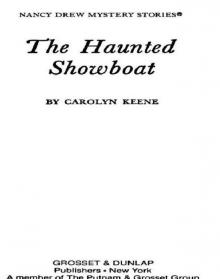 The Haunted Showboat
The Haunted Showboat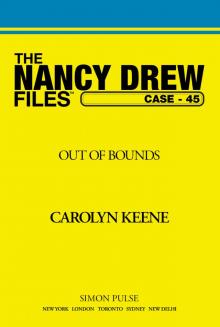 Out of Bounds
Out of Bounds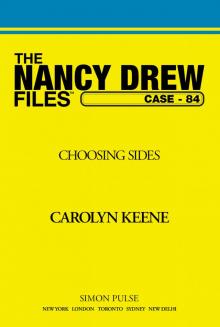 Choosing Sides
Choosing Sides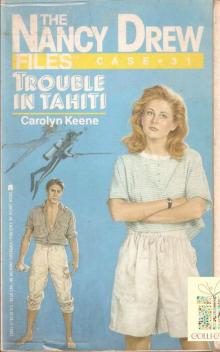 031 Trouble in Tahiti
031 Trouble in Tahiti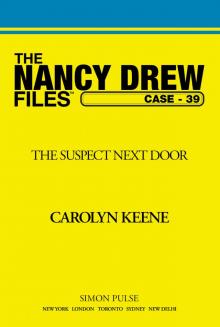 The Suspect Next Door
The Suspect Next Door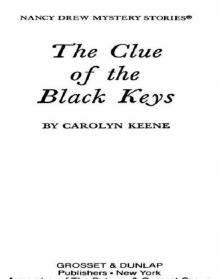 The Clue of the Black Keys
The Clue of the Black Keys The Secret Santa
The Secret Santa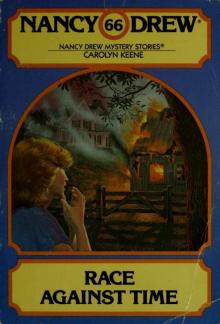 Race Against Time
Race Against Time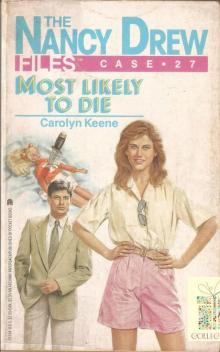 027 Most Likely to Die
027 Most Likely to Die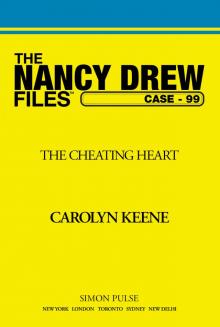 The Cheating Heart
The Cheating Heart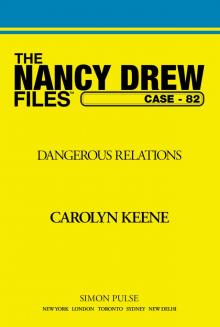 Dangerous Relations
Dangerous Relations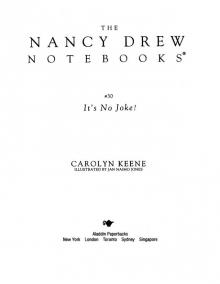 It's No Joke!
It's No Joke! The Mystery of the Mother Wolf
The Mystery of the Mother Wolf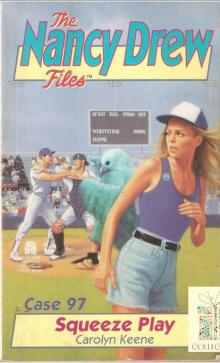 097 Squeeze Play
097 Squeeze Play Secret at Mystic Lake
Secret at Mystic Lake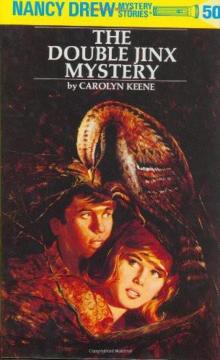 The Double Jinx Mystery
The Double Jinx Mystery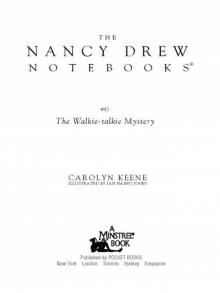 The Walkie Talkie Mystery
The Walkie Talkie Mystery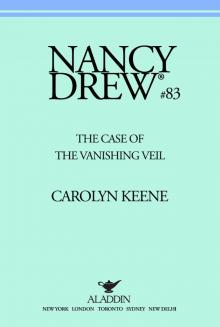 The Case of the Vanishing Veil
The Case of the Vanishing Veil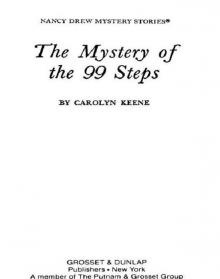 The Mystery of the 99 Steps
The Mystery of the 99 Steps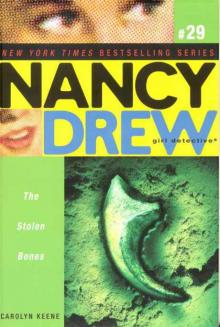 The Stolen Bones
The Stolen Bones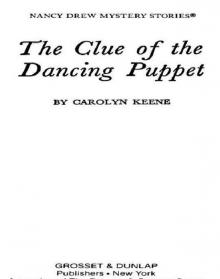 The Clue of the Dancing Puppet
The Clue of the Dancing Puppet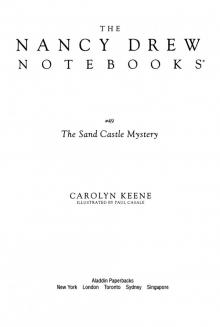 The Sand Castle Mystery
The Sand Castle Mystery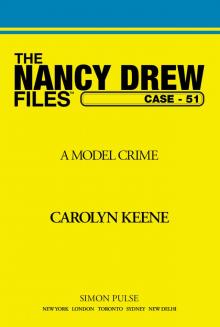 A Model Crime
A Model Crime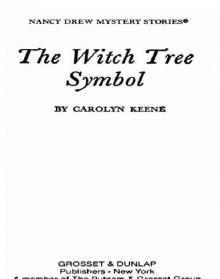 The Witch Tree Symbol
The Witch Tree Symbol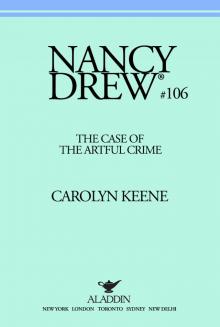 The Case of the Artful Crime
The Case of the Artful Crime Mall Madness
Mall Madness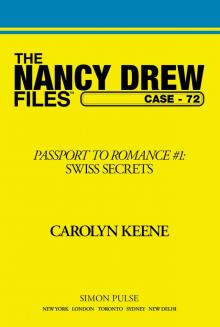 Swiss Secrets
Swiss Secrets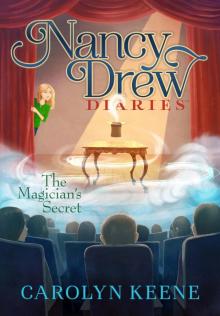 The Magician's Secret
The Magician's Secret Tall, Dark and Deadly
Tall, Dark and Deadly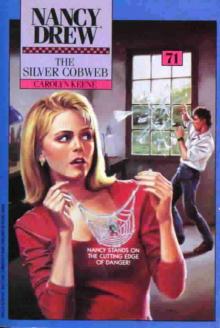 The Silver Cobweb
The Silver Cobweb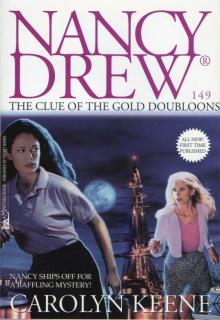 The Clue of the Gold Doubloons
The Clue of the Gold Doubloons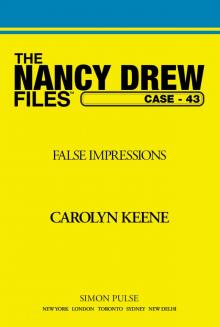 False Impressions
False Impressions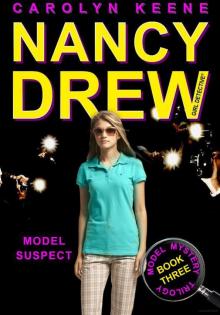 Model Suspect
Model Suspect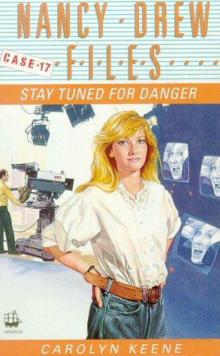 Stay Tuned for Danger
Stay Tuned for Danger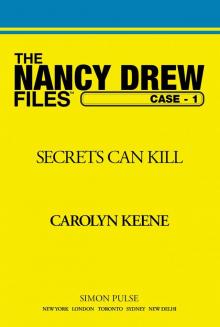 Secrets Can Kill
Secrets Can Kill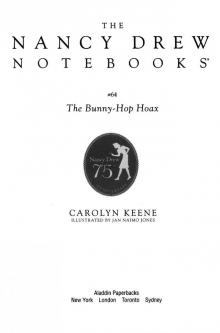 The Bunny-Hop Hoax
The Bunny-Hop Hoax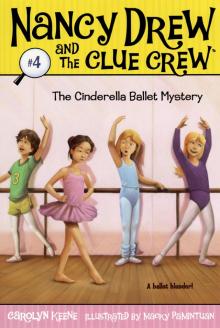 The Cinderella Ballet Mystery
The Cinderella Ballet Mystery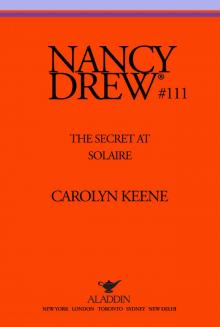 The Secret at Solaire
The Secret at Solaire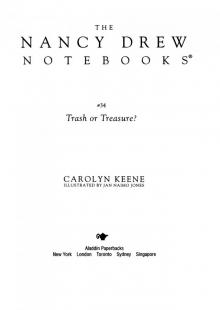 Trash or Treasure?
Trash or Treasure?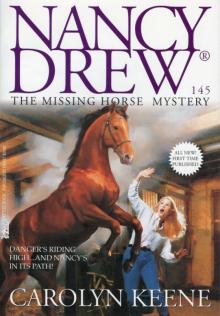 The Missing Horse Mystery
The Missing Horse Mystery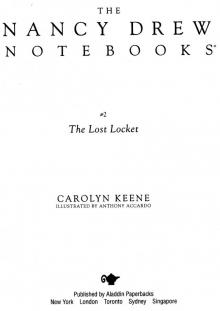 The Lost Locket
The Lost Locket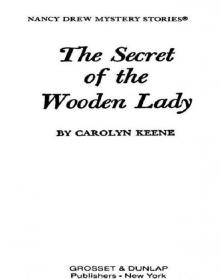 The Secret of the Wooden Lady
The Secret of the Wooden Lady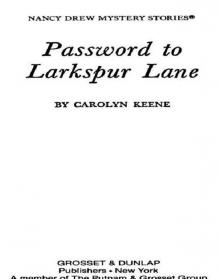 Password to Larkspur Lane
Password to Larkspur Lane Movie Madness
Movie Madness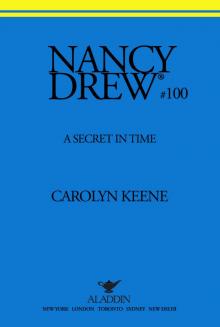 A Secret in Time
A Secret in Time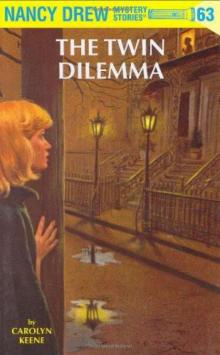 The Twin Dilemma
The Twin Dilemma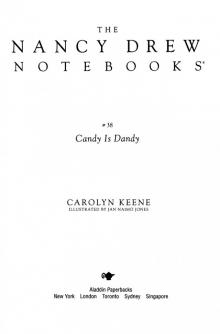 Candy Is Dandy
Candy Is Dandy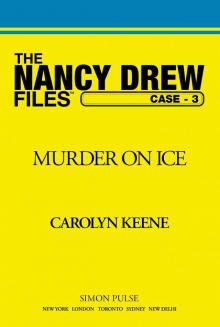 Murder on Ice
Murder on Ice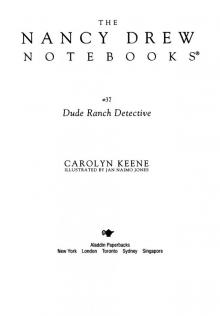 Dude Ranch Detective
Dude Ranch Detective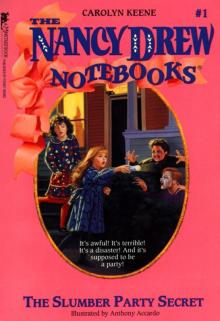 The Slumber Party Secret
The Slumber Party Secret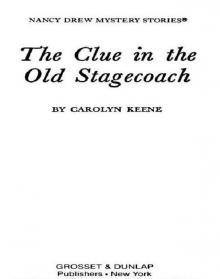 The Clue in the Old Stagecoach
The Clue in the Old Stagecoach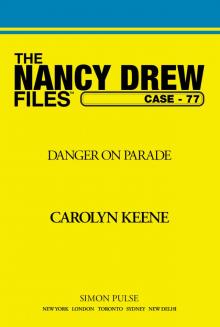 Danger on Parade
Danger on Parade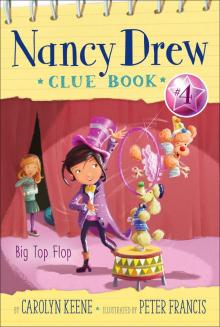 Big Top Flop
Big Top Flop Strangers on a Train
Strangers on a Train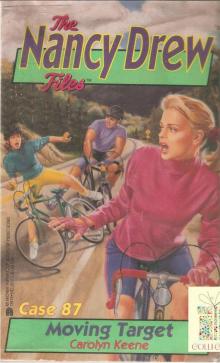 087 Moving Target
087 Moving Target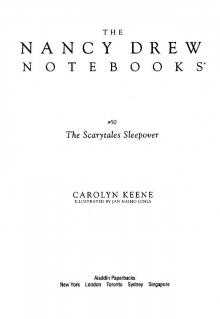 The Scarytales Sleepover
The Scarytales Sleepover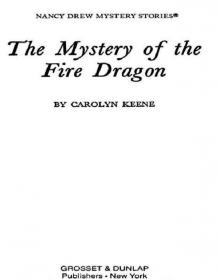 The Mystery of the Fire Dragon
The Mystery of the Fire Dragon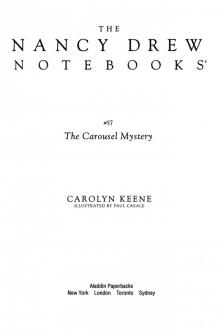 The Carousel Mystery
The Carousel Mystery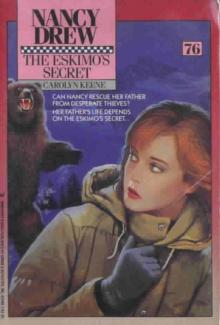 The Eskimo's Secret
The Eskimo's Secret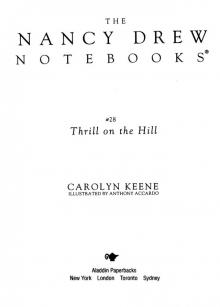 Thrill on the Hill
Thrill on the Hill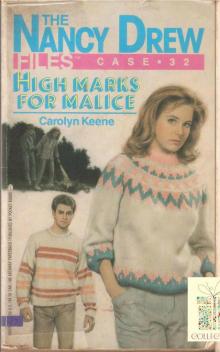 032 High Marks for Malice
032 High Marks for Malice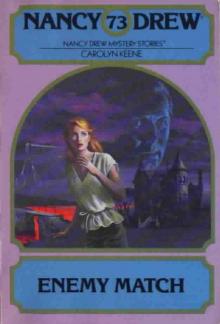 Enemy Match
Enemy Match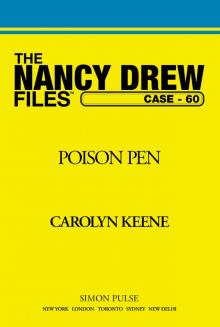 Poison Pen
Poison Pen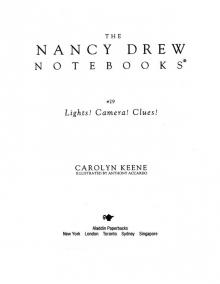 Lights, Camera . . . Cats!
Lights, Camera . . . Cats! Lost in the Everglades
Lost in the Everglades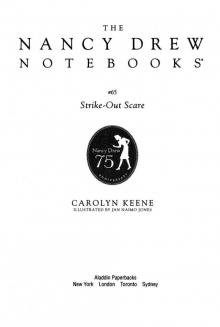 Strike-Out Scare
Strike-Out Scare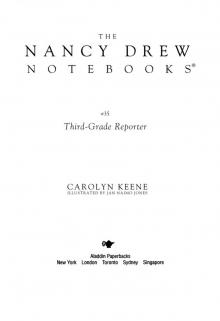 Third-Grade Reporter
Third-Grade Reporter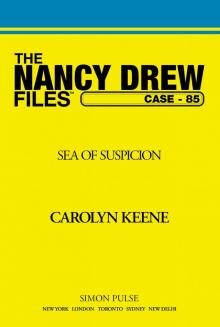 Sea of Suspicion
Sea of Suspicion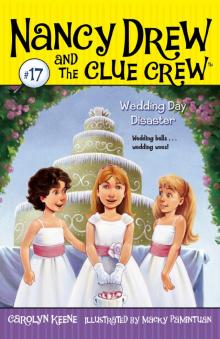 Wedding Day Disaster
Wedding Day Disaster The Make-A-Pet Mystery
The Make-A-Pet Mystery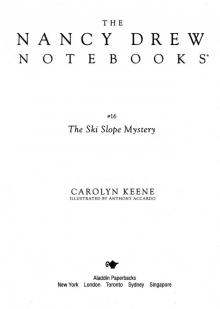 The Ski Slope Mystery
The Ski Slope Mystery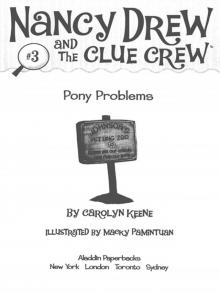 Pony Problems
Pony Problems Candy Kingdom Chaos
Candy Kingdom Chaos The Sign in the Smoke
The Sign in the Smoke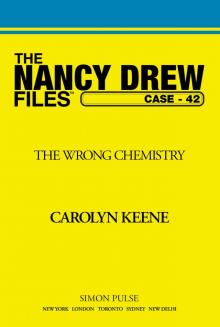 The Wrong Chemistry
The Wrong Chemistry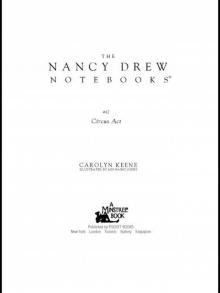 Circus Act
Circus Act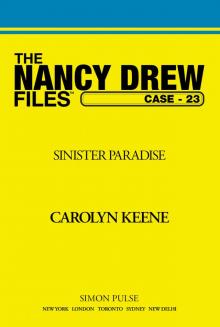 Sinister Paradise
Sinister Paradise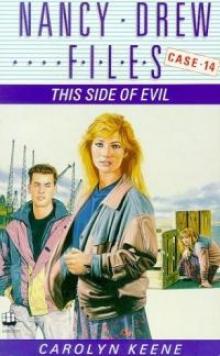 This Side of Evil
This Side of Evil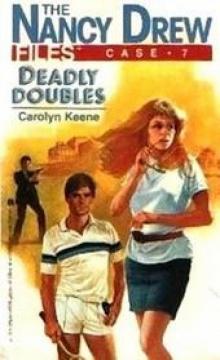 Deadly Doubles
Deadly Doubles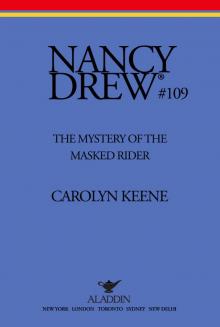 The Mystery of the Masked Rider
The Mystery of the Masked Rider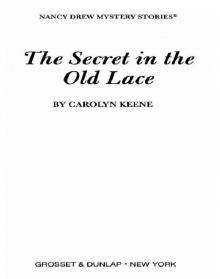 The Secret in the Old Lace
The Secret in the Old Lace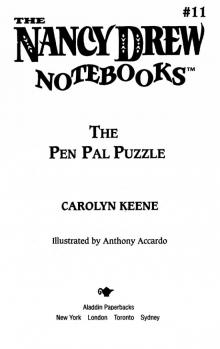 The Pen Pal Puzzle
The Pen Pal Puzzle Without a Trace
Without a Trace Whose Pet Is Best?
Whose Pet Is Best?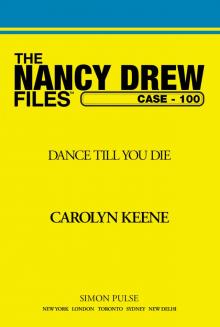 Dance Till You Die
Dance Till You Die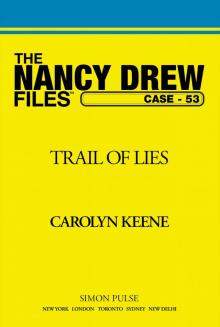 Trail of Lies
Trail of Lies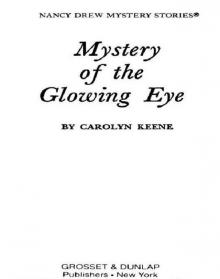 Mystery of the Glowing Eye
Mystery of the Glowing Eye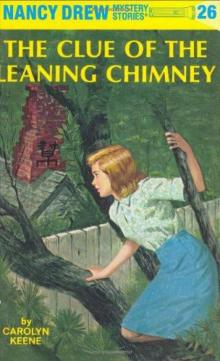 The Clue of the Leaning Chimney
The Clue of the Leaning Chimney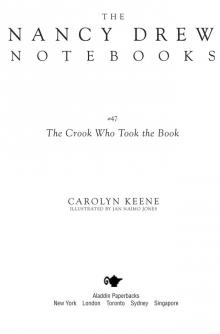 The Crook Who Took the Book
The Crook Who Took the Book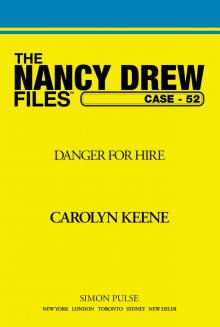 Danger for Hire
Danger for Hire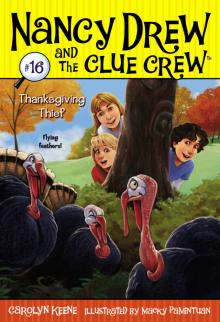 Thanksgiving Thief
Thanksgiving Thief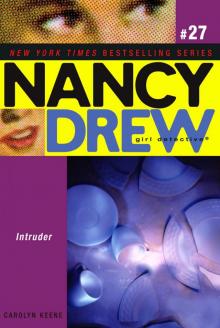 Intruder!
Intruder!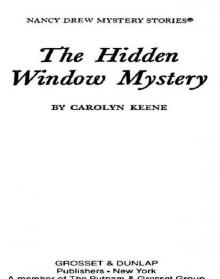 The Hidden Window Mystery
The Hidden Window Mystery Win, Place or Die
Win, Place or Die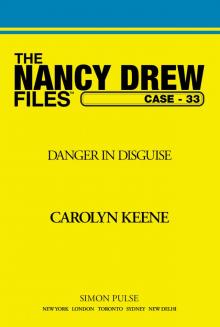 Danger in Disguise
Danger in Disguise The Best Detective
The Best Detective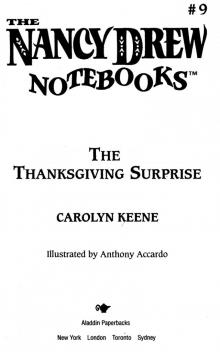 The Thanksgiving Surprise
The Thanksgiving Surprise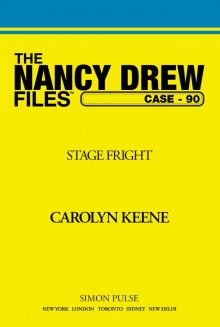 Stage Fright
Stage Fright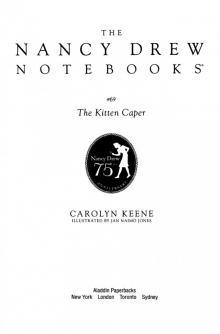 The Kitten Caper
The Kitten Caper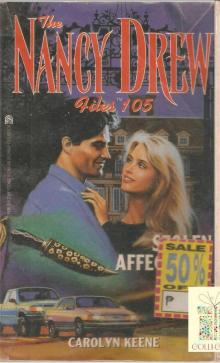 Stolen Affections
Stolen Affections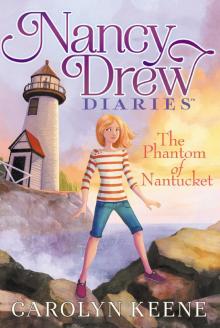 The Phantom of Nantucket
The Phantom of Nantucket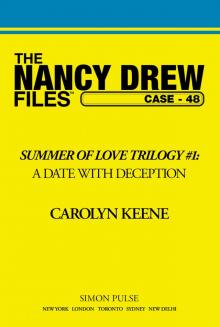 Date With Deception
Date With Deception Cooking Camp Disaster
Cooking Camp Disaster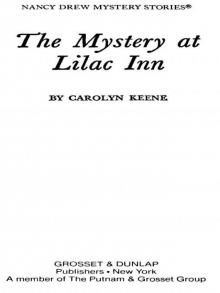 The Mystery at Lilac Inn
The Mystery at Lilac Inn Springtime Crime
Springtime Crime Action!
Action! Into Thin Air
Into Thin Air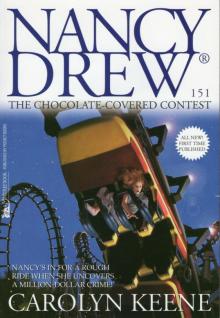 The Chocolate-Covered Contest
The Chocolate-Covered Contest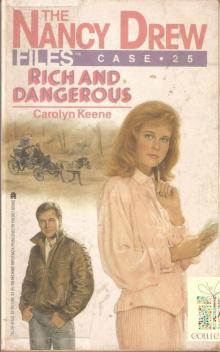 025 Rich and Dangerous
025 Rich and Dangerous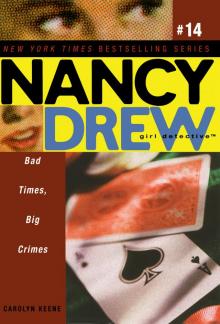 Bad Times, Big Crimes
Bad Times, Big Crimes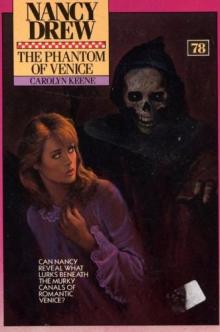 078 The Phantom Of Venice
078 The Phantom Of Venice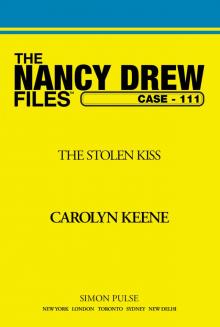 The Stolen Kiss
The Stolen Kiss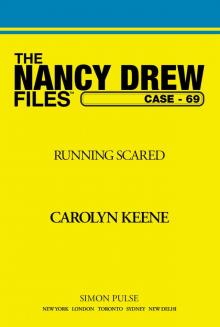 Running Scared
Running Scared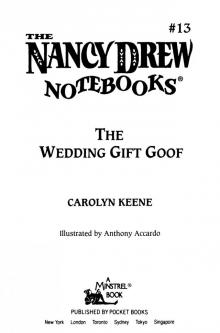 The Wedding Gift Goof
The Wedding Gift Goof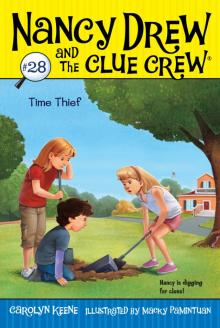 Time Thief
Time Thief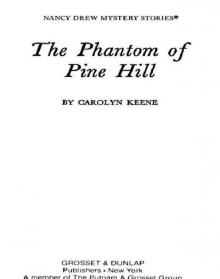 The Phantom of Pine Hill
The Phantom of Pine Hill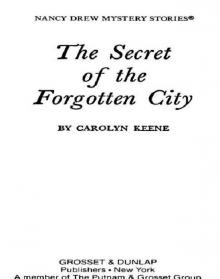 The Secret of the Forgotten City
The Secret of the Forgotten City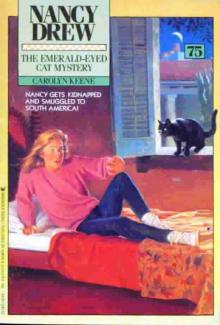 The Emerald-Eyed Cat Mystery
The Emerald-Eyed Cat Mystery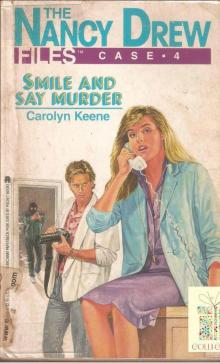 004 Smile and Say Murder
004 Smile and Say Murder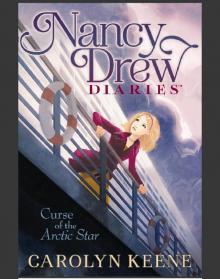 Curse of the Arctic Star
Curse of the Arctic Star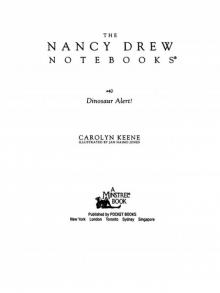 Dinosaur Alert!
Dinosaur Alert!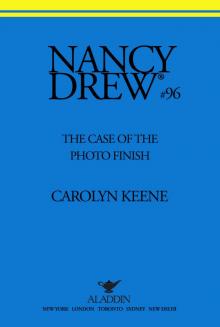 The Case of the Photo Finish
The Case of the Photo Finish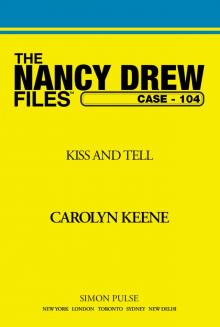 Kiss and Tell
Kiss and Tell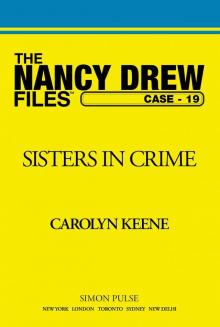 Sisters in Crime
Sisters in Crime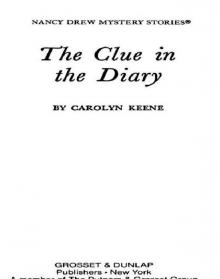 The Clue in the Diary
The Clue in the Diary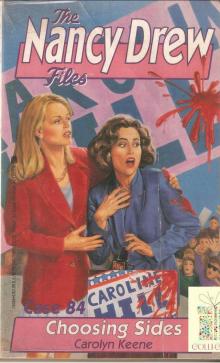 084 Choosing Sides
084 Choosing Sides Haunting of Horse Island
Haunting of Horse Island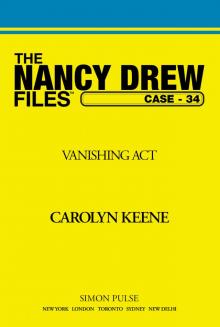 Vanishing Act
Vanishing Act The Big Island Burglary
The Big Island Burglary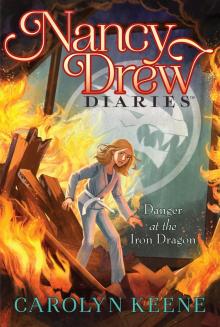 Danger at the Iron Dragon
Danger at the Iron Dragon Pets on Parade
Pets on Parade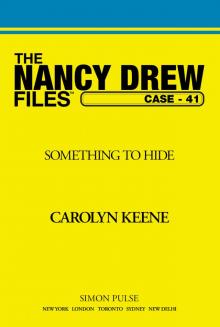 Something to Hide
Something to Hide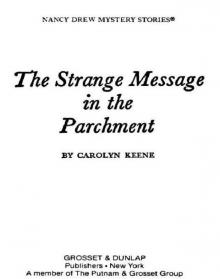 The Strange Message in the Parchment
The Strange Message in the Parchment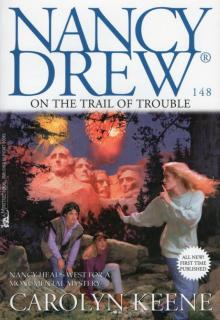 On the Trail of Trouble
On the Trail of Trouble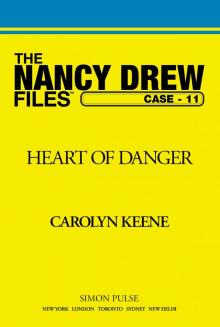 Heart of Danger
Heart of Danger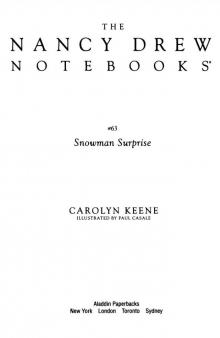 The Snowman Surprise
The Snowman Surprise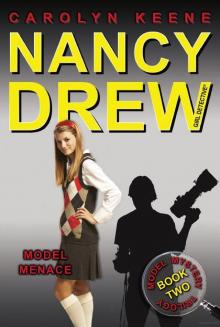 Model Menace
Model Menace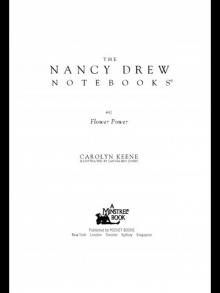 Flower Power
Flower Power The Great Goat Gaffe
The Great Goat Gaffe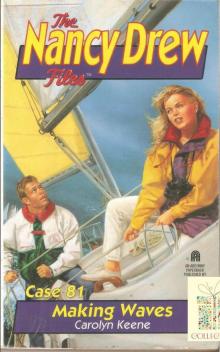 081 Making Waves
081 Making Waves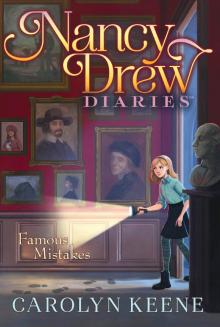 Famous Mistakes
Famous Mistakes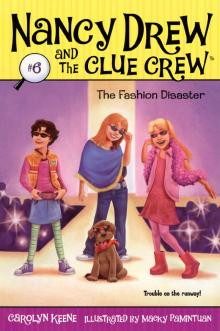 The Fashion Disaster
The Fashion Disaster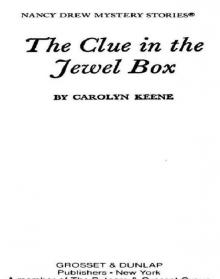 The Clue in the Jewel Box
The Clue in the Jewel Box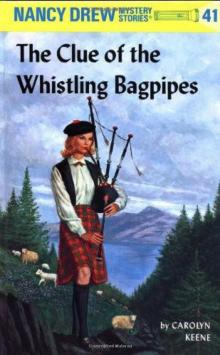 The Clue of the Whistling Bagpipes
The Clue of the Whistling Bagpipes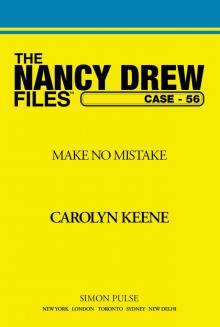 Make No Mistake
Make No Mistake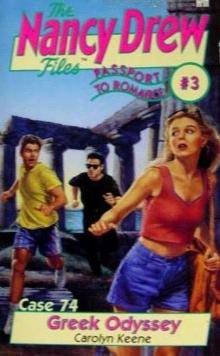 Greek Odyssey
Greek Odyssey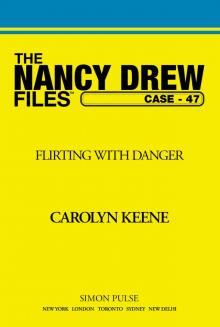 Flirting With Danger
Flirting With Danger Double Take
Double Take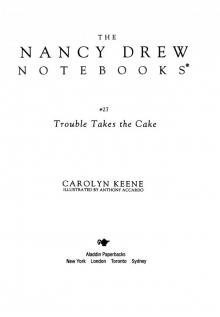 Trouble Takes the Cake
Trouble Takes the Cake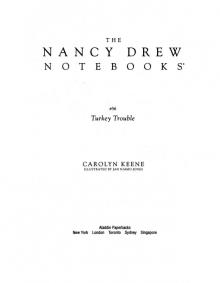 Turkey Trouble
Turkey Trouble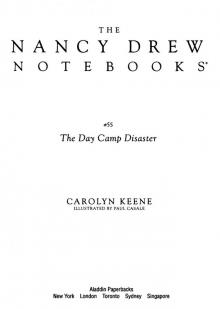 The Day Camp Disaster
The Day Camp Disaster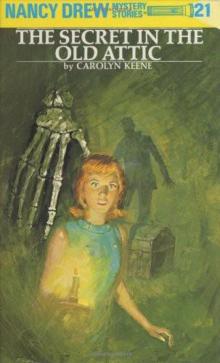 The Secret in the Old Attic
The Secret in the Old Attic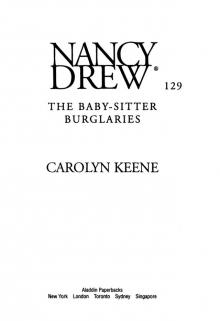 The Baby-Sitter Burglaries
The Baby-Sitter Burglaries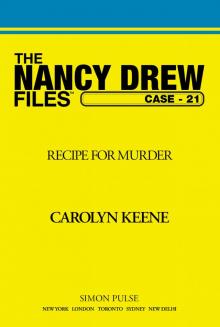 Recipe for Murder
Recipe for Murder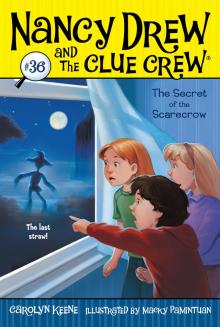 The Secret of the Scarecrow
The Secret of the Scarecrow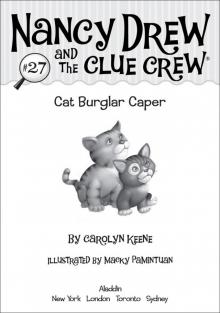 Cat Burglar Caper
Cat Burglar Caper Turkey Trot Plot
Turkey Trot Plot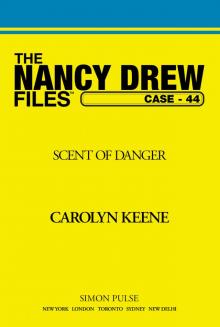 Scent of Danger
Scent of Danger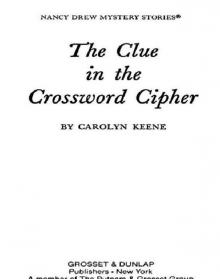 The Clue in the Crossword Cipher
The Clue in the Crossword Cipher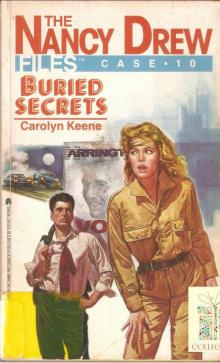 010 Buried Secrets
010 Buried Secrets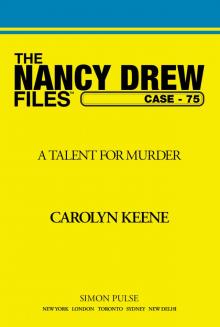 A Talent for Murder
A Talent for Murder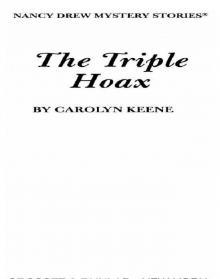 The Triple Hoax
The Triple Hoax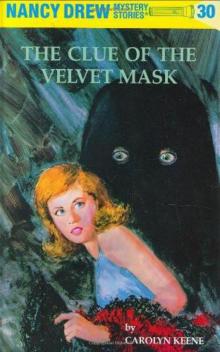 The Clue of the Velvet Mask
The Clue of the Velvet Mask Last Lemonade Standing
Last Lemonade Standing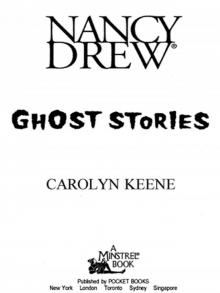 The Ghost of Blackwood Hall
The Ghost of Blackwood Hall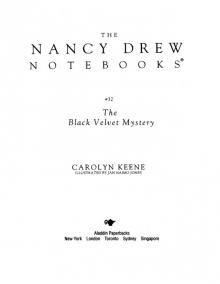 The Black Velvet Mystery
The Black Velvet Mystery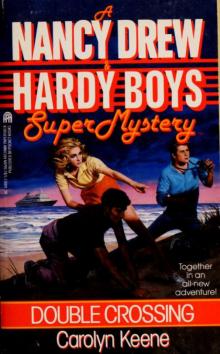 Double Crossing
Double Crossing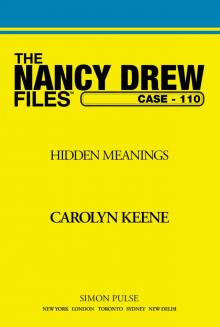 Hidden Meanings
Hidden Meanings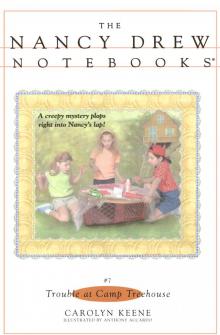 Trouble at Camp Treehouse
Trouble at Camp Treehouse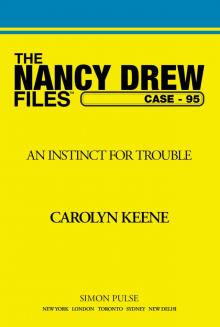 An Instinct for Trouble
An Instinct for Trouble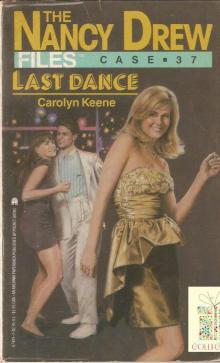 037 Last Dance
037 Last Dance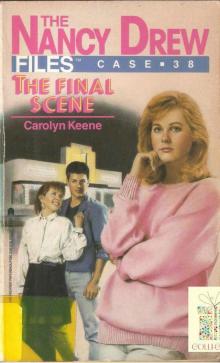 038 The Final Scene
038 The Final Scene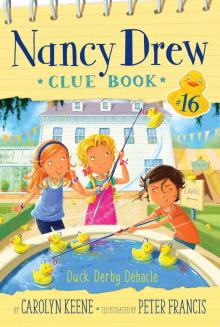 Duck Derby Debacle
Duck Derby Debacle The Pumpkin Patch Puzzle
The Pumpkin Patch Puzzle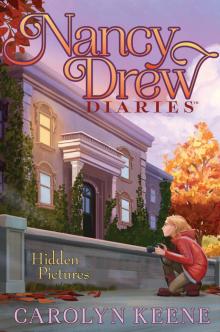 Hidden Pictures
Hidden Pictures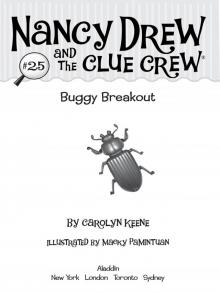 Buggy Breakout
Buggy Breakout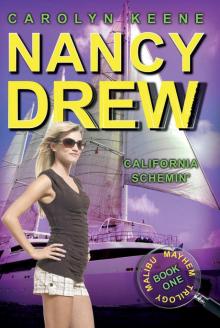 California Schemin'
California Schemin'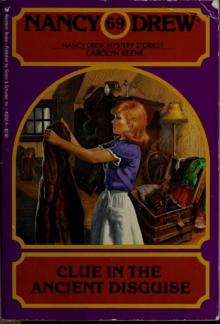 Clue in the Ancient Disguise
Clue in the Ancient Disguise Case of the Sneaky Snowman
Case of the Sneaky Snowman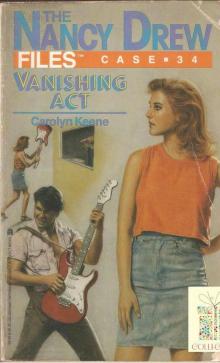 034 Vanishing Act
034 Vanishing Act A Script for Danger
A Script for Danger The Flower Show Fiasco
The Flower Show Fiasco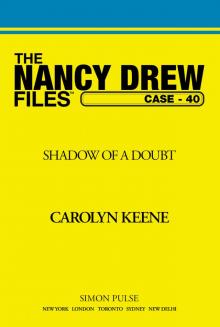 Shadow of a Doubt
Shadow of a Doubt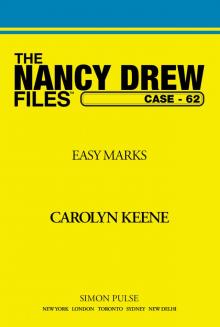 Easy Marks
Easy Marks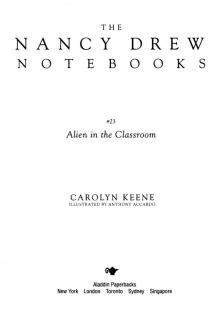 Alien in the Classroom
Alien in the Classroom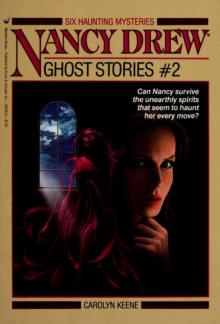 Ghost Stories, #2 (Nancy Drew)
Ghost Stories, #2 (Nancy Drew)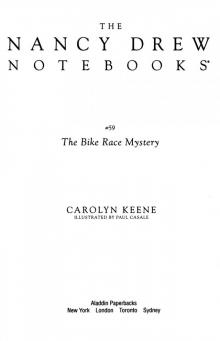 The Bike Race Mystery
The Bike Race Mystery False Pretenses
False Pretenses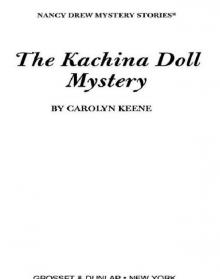 The Kachina Doll Mystery
The Kachina Doll Mystery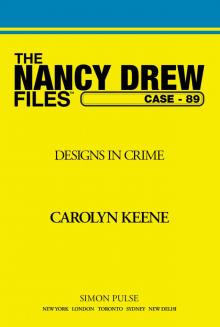 Designs in Crime
Designs in Crime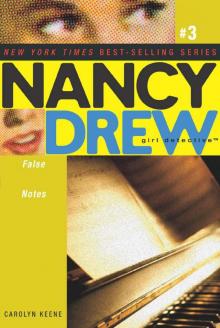 False Notes
False Notes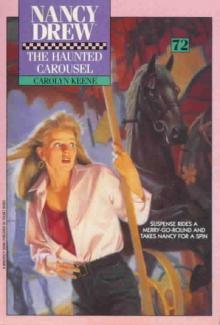 The Haunted Carousel
The Haunted Carousel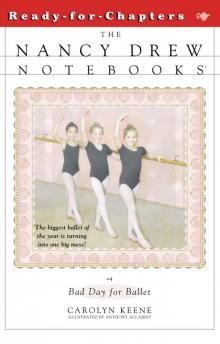 Bad Day for Ballet
Bad Day for Ballet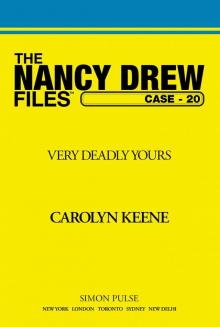 Very Deadly Yours
Very Deadly Yours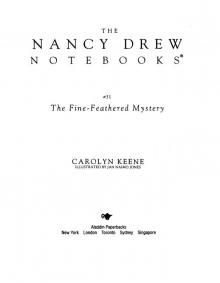 The Fine-Feathered Mystery
The Fine-Feathered Mystery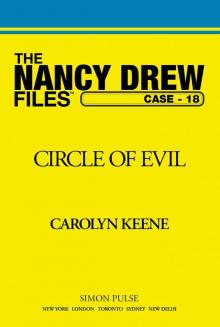 Circle of Evil
Circle of Evil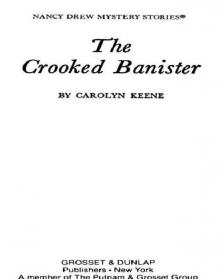 The Crooked Banister
The Crooked Banister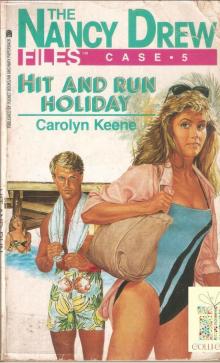 005 Hit and Run Holiday
005 Hit and Run Holiday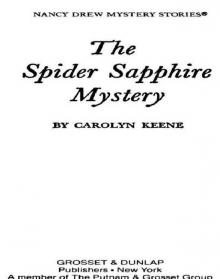 The Spider Sapphire Mystery
The Spider Sapphire Mystery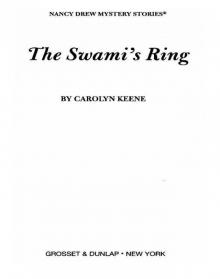 The Swami's Ring
The Swami's Ring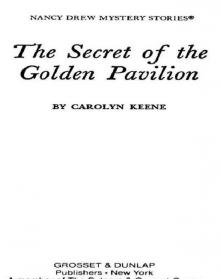 The Secret of the Golden Pavilion
The Secret of the Golden Pavilion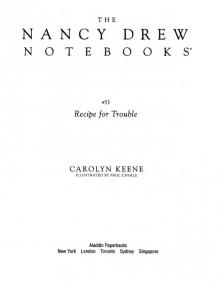 Recipe for Trouble
Recipe for Trouble Betrayed by Love
Betrayed by Love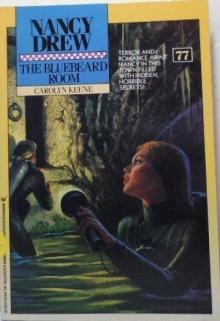 The Bluebeard Room
The Bluebeard Room Sweet Revenge
Sweet Revenge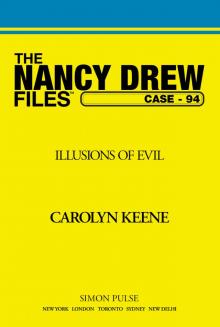 Illusions of Evil
Illusions of Evil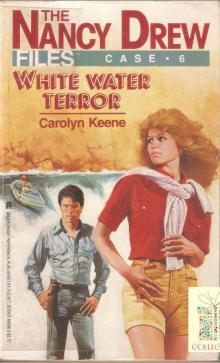 006 White Water Terror
006 White Water Terror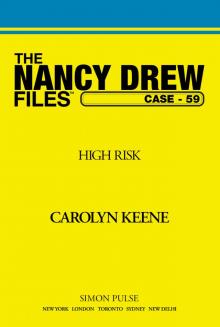 High Risk
High Risk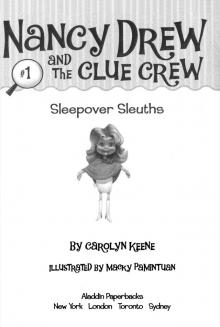 Sleepover Sleuths
Sleepover Sleuths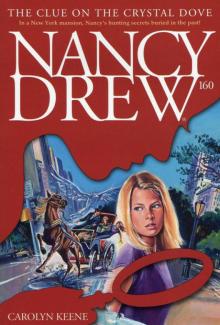 The Clue on the Crystal Dove
The Clue on the Crystal Dove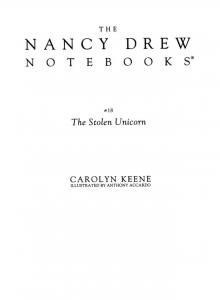 The Stolen Unicorn
The Stolen Unicorn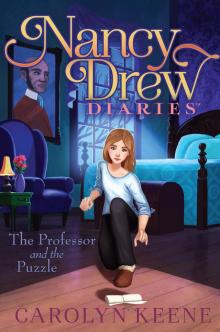 The Professor and the Puzzle
The Professor and the Puzzle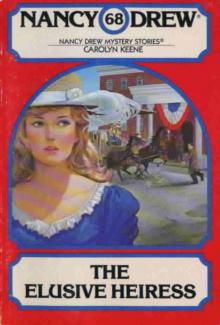 The Elusive Heiress
The Elusive Heiress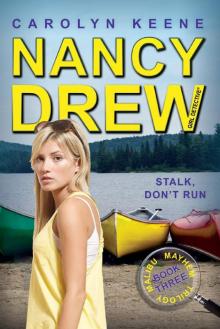 Stalk, Don't Run
Stalk, Don't Run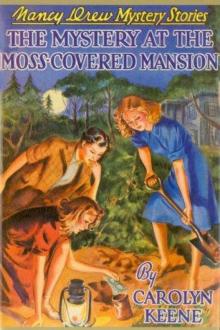 The Mystery at the Moss-Covered Mansion
The Mystery at the Moss-Covered Mansion The Tortoise and the Scare
The Tortoise and the Scare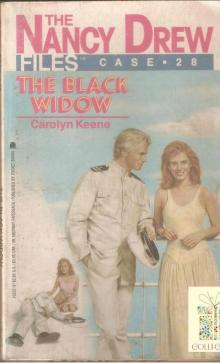 028 The Black Widow
028 The Black Widow Big Worry in Wonderland
Big Worry in Wonderland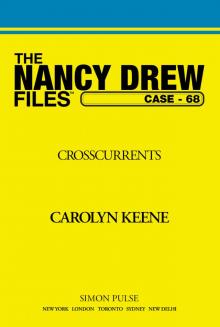 Crosscurrents
Crosscurrents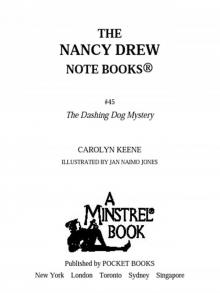 The Dashing Dog Mystery
The Dashing Dog Mystery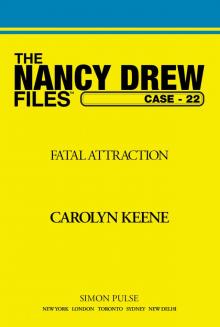 Fatal Attraction
Fatal Attraction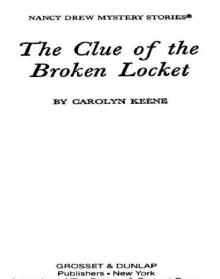 The Clue of the Broken Locket
The Clue of the Broken Locket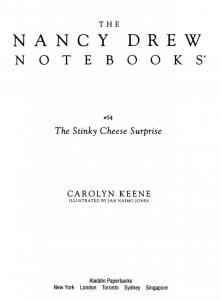 The Stinky Cheese Surprise
The Stinky Cheese Surprise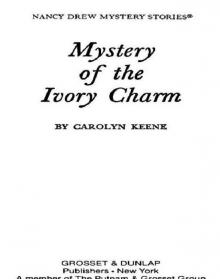 Mystery of the Ivory Charm
Mystery of the Ivory Charm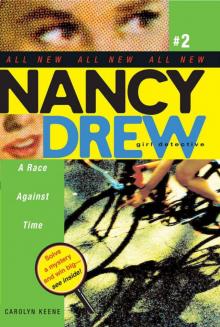 A Race Against Time
A Race Against Time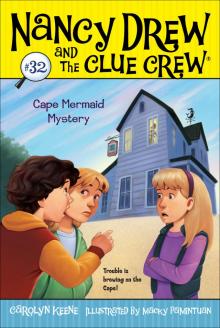 Cape Mermaid Mystery
Cape Mermaid Mystery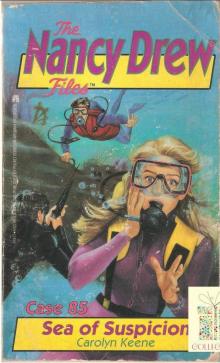 085 Sea of Suspicion
085 Sea of Suspicion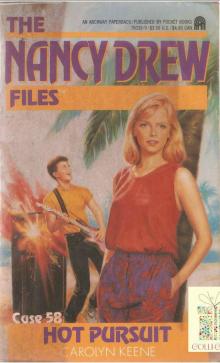 058 Hot Pursuit
058 Hot Pursuit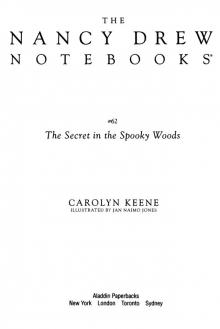 The Secret in the Spooky Woods
The Secret in the Spooky Woods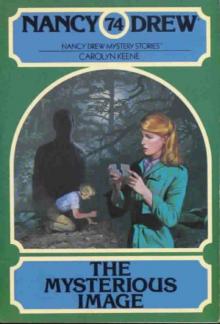 The Mysterious Image
The Mysterious Image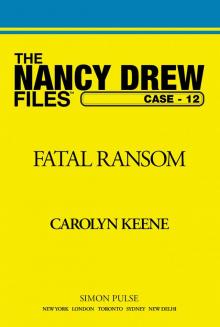 Fatal Ransom
Fatal Ransom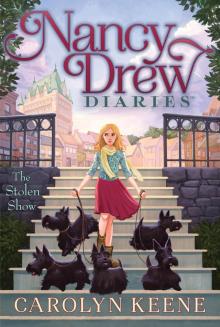 The Stolen Show
The Stolen Show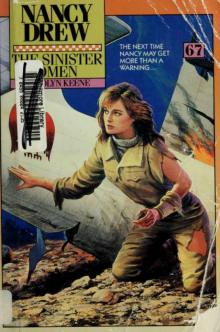 The Sinister Omen
The Sinister Omen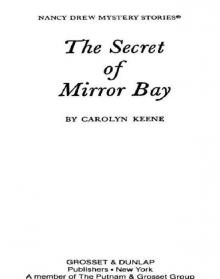 The Secret of Mirror Bay
The Secret of Mirror Bay Rendezvous in Rome
Rendezvous in Rome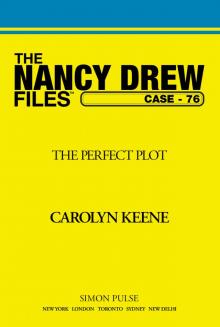 The Perfect Plot
The Perfect Plot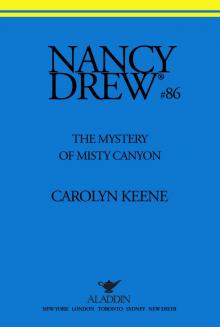 The Mystery of Misty Canyon
The Mystery of Misty Canyon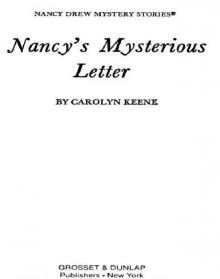 Nancy's Mysterious Letter
Nancy's Mysterious Letter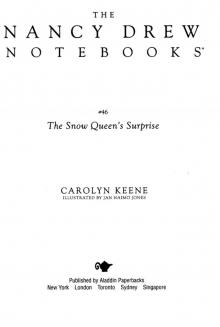 The Snow Queen's Surprise
The Snow Queen's Surprise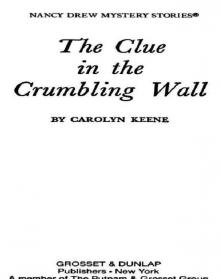 The Clue in the Crumbling Wall
The Clue in the Crumbling Wall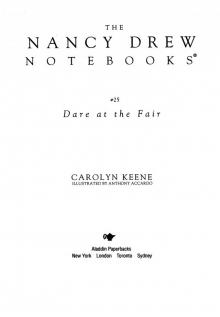 Dare at the Fair
Dare at the Fair Scream for Ice Cream
Scream for Ice Cream A Star Witness
A Star Witness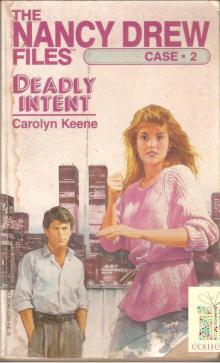 002 Deadly Intent
002 Deadly Intent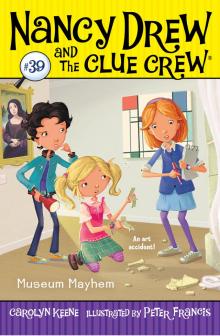 Museum Mayhem
Museum Mayhem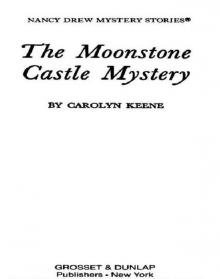 The Moonstone Castle Mystery
The Moonstone Castle Mystery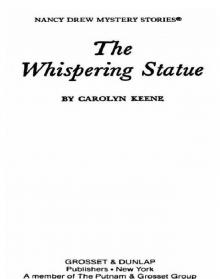 The Whispering Statue
The Whispering Statue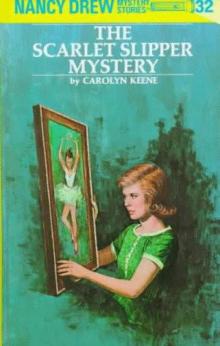 The Scarlet Slipper Mystery
The Scarlet Slipper Mystery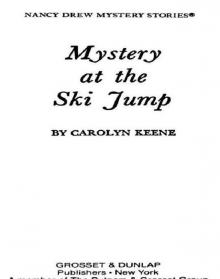 Mystery at the Ski Jump
Mystery at the Ski Jump Hot Pursuit
Hot Pursuit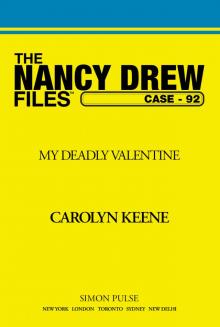 My Deadly Valentine
My Deadly Valentine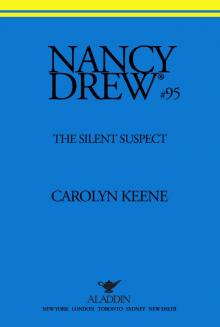 The Silent Suspect
The Silent Suspect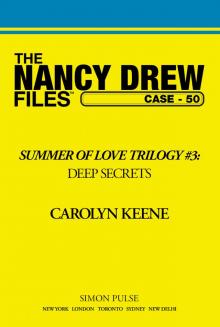 Deep Secrets
Deep Secrets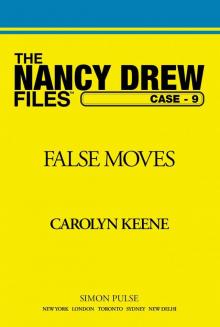 False Moves
False Moves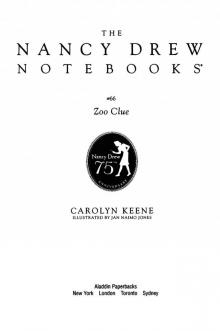 The Zoo Crew
The Zoo Crew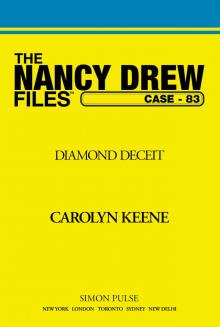 Diamond Deceit
Diamond Deceit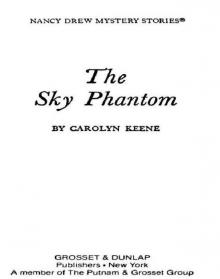 The Sky Phantom
The Sky Phantom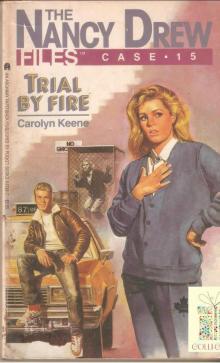 015 Trial by Fire
015 Trial by Fire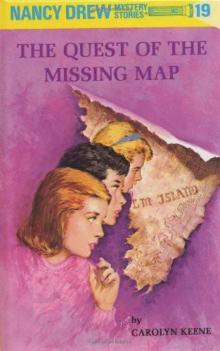 The Quest of the Missing Map
The Quest of the Missing Map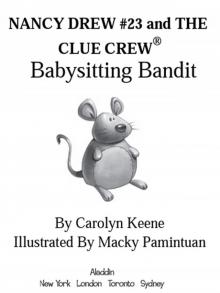 Babysitting Bandit
Babysitting Bandit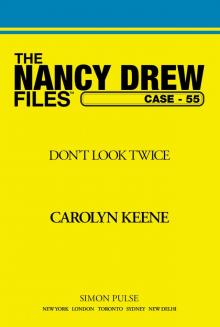 Don't Look Twice
Don't Look Twice Never Say Die
Never Say Die The Soccer Shoe Clue
The Soccer Shoe Clue Pool Party Puzzler
Pool Party Puzzler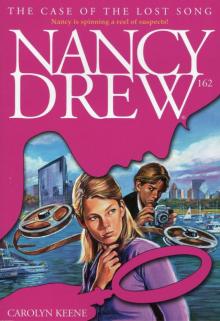 The Case of the Lost Song
The Case of the Lost Song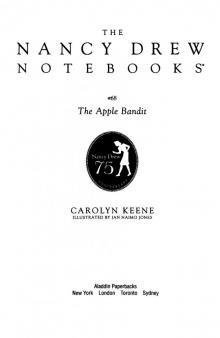 The Apple Bandit
The Apple Bandit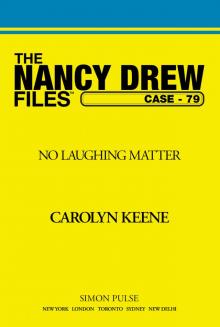 No Laughing Matter
No Laughing Matter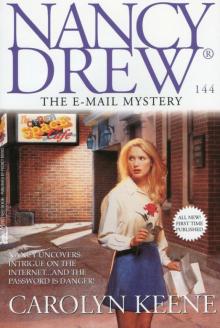 The Thirteenth Pearl
The Thirteenth Pearl Sabotage at Willow Woods
Sabotage at Willow Woods Butterfly Blues
Butterfly Blues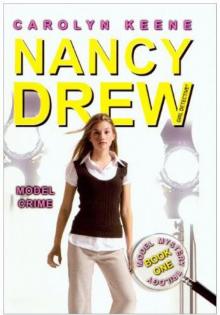 Model Crime 1
Model Crime 1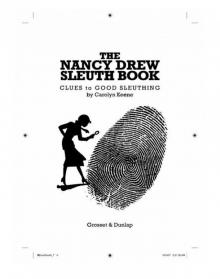 The Nancy Drew Sleuth Book
The Nancy Drew Sleuth Book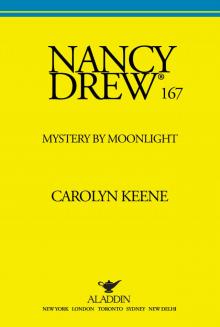 Mystery by Moonlight
Mystery by Moonlight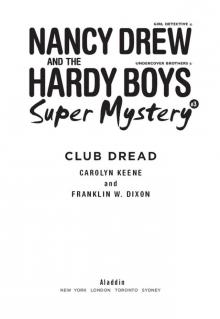 Club Dread
Club Dread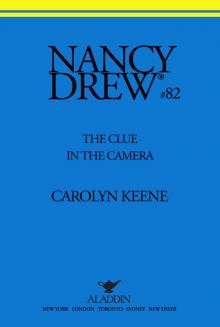 The Clue in the Camera
The Clue in the Camera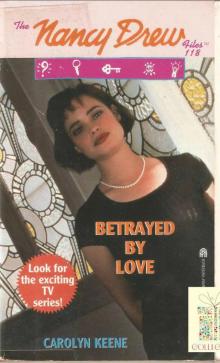 118 Betrayed By Love
118 Betrayed By Love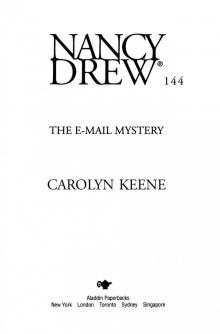 The E-Mail Mystery (Nancy Drew Book 144)
The E-Mail Mystery (Nancy Drew Book 144)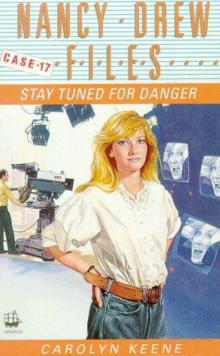 Stay Tuned for Danger: Circle of Evil
Stay Tuned for Danger: Circle of Evil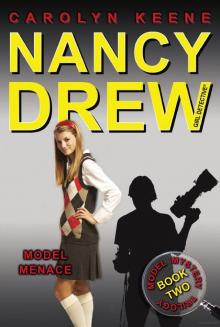 Model Menace 2
Model Menace 2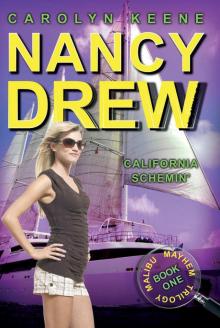 California Schemin': Book One in the Malibu Mayhem Trilogy
California Schemin': Book One in the Malibu Mayhem Trilogy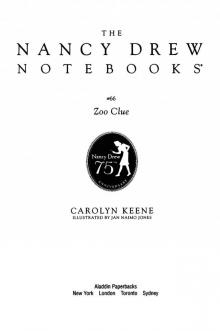 Zoo Clue (Nancy Drew Notebooks)
Zoo Clue (Nancy Drew Notebooks)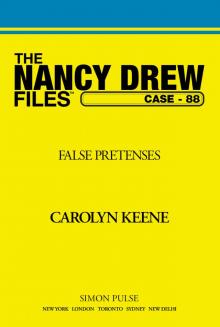 False Pretences
False Pretences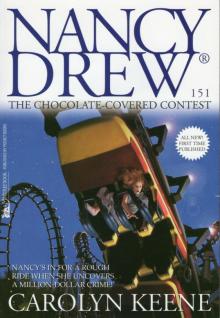 151 The Chocolate-Covered Contest
151 The Chocolate-Covered Contest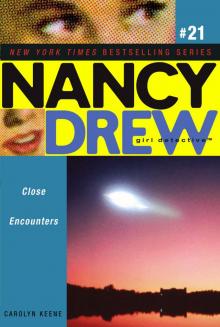 Close Encounters
Close Encounters The Emeral-Eyed Cat Mystery
The Emeral-Eyed Cat Mystery Boo Crew
Boo Crew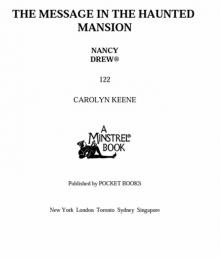 The Message in the Haunted Mansion (Nancy Drew Book 122)
The Message in the Haunted Mansion (Nancy Drew Book 122) A Nancy Drew Christmas
A Nancy Drew Christmas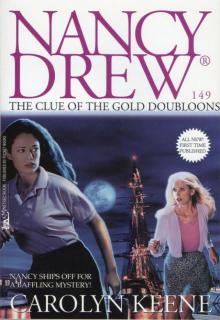 149 The Clue Of The Gold Doubloons
149 The Clue Of The Gold Doubloons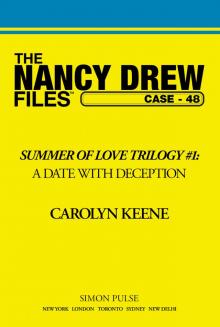 A Date with Deception
A Date with Deception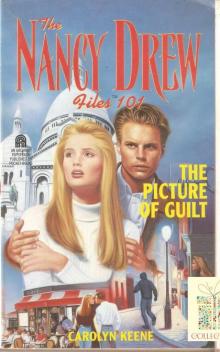 101 The Picture of Guilt
101 The Picture of Guilt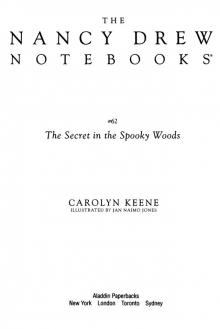 The Secret in the Spooky Woods (Nancy Drew Notebooks Book 62)
The Secret in the Spooky Woods (Nancy Drew Notebooks Book 62)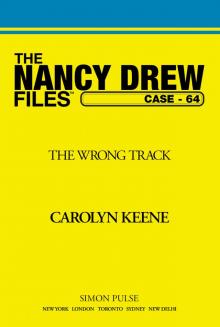 The Wrong Track
The Wrong Track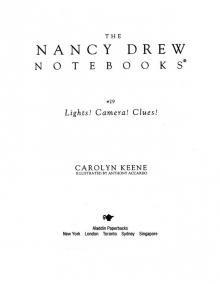 Lights! Camera! Clues!
Lights! Camera! Clues!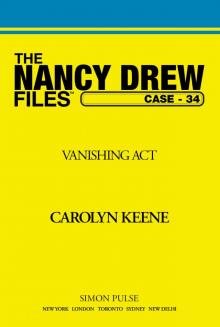 The Vanishing Act
The Vanishing Act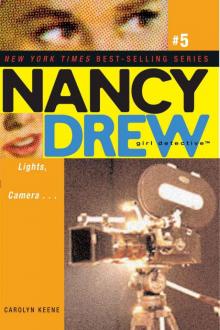 Lights, Camera . . .
Lights, Camera . . .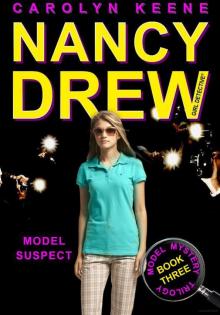 Model Suspect 3
Model Suspect 3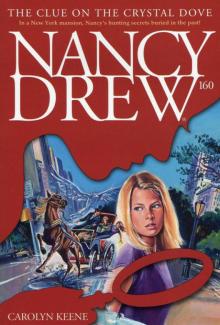 160 The Clue On The Crystal Dove
160 The Clue On The Crystal Dove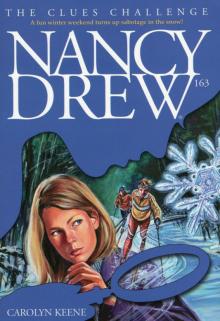 163 The Clues Challenge
163 The Clues Challenge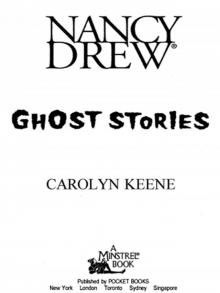 Ghost Stories (Nancy Drew)
Ghost Stories (Nancy Drew)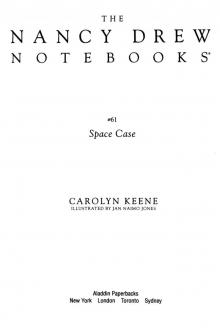 Space Case (Nancy Drew Notebooks Book 61)
Space Case (Nancy Drew Notebooks Book 61) 164 The Mystery Of The Mother Wolf
164 The Mystery Of The Mother Wolf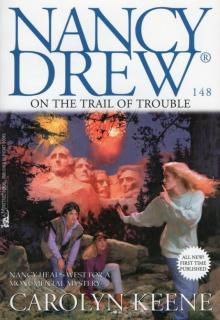 148 On The Trail Of Trouble
148 On The Trail Of Trouble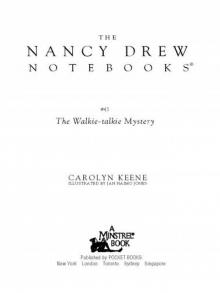 The Walkie-Talkie Mystery
The Walkie-Talkie Mystery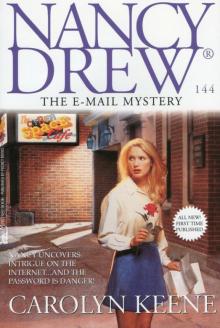 The E-Mail Mystery
The E-Mail Mystery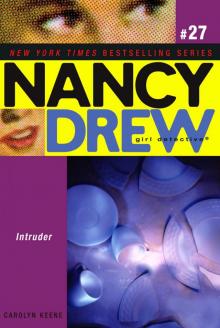 Intruder (Nancy Drew (All New) Girl Detective)
Intruder (Nancy Drew (All New) Girl Detective)![The Stolen Relic [Nancy Drew Girl Detective 007] Read online](http://i1.bookreadfree.com/i2/04/11/the_stolen_relic_nancy_drew_girl_detective_007_preview.jpg) The Stolen Relic [Nancy Drew Girl Detective 007]
The Stolen Relic [Nancy Drew Girl Detective 007]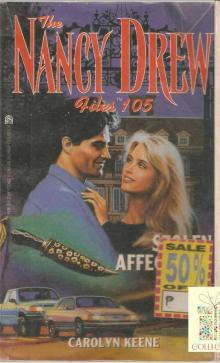 105 Stolen Affections
105 Stolen Affections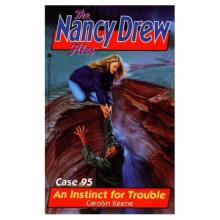 An Instict for Trouble
An Instict for Trouble 161 Lost In The Everglades
161 Lost In The Everglades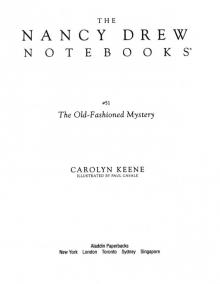 The Old-Fashioned Mystery
The Old-Fashioned Mystery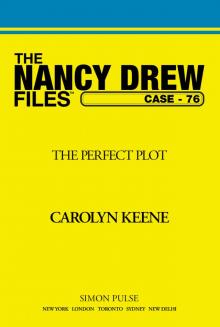 Perfect Plot
Perfect Plot